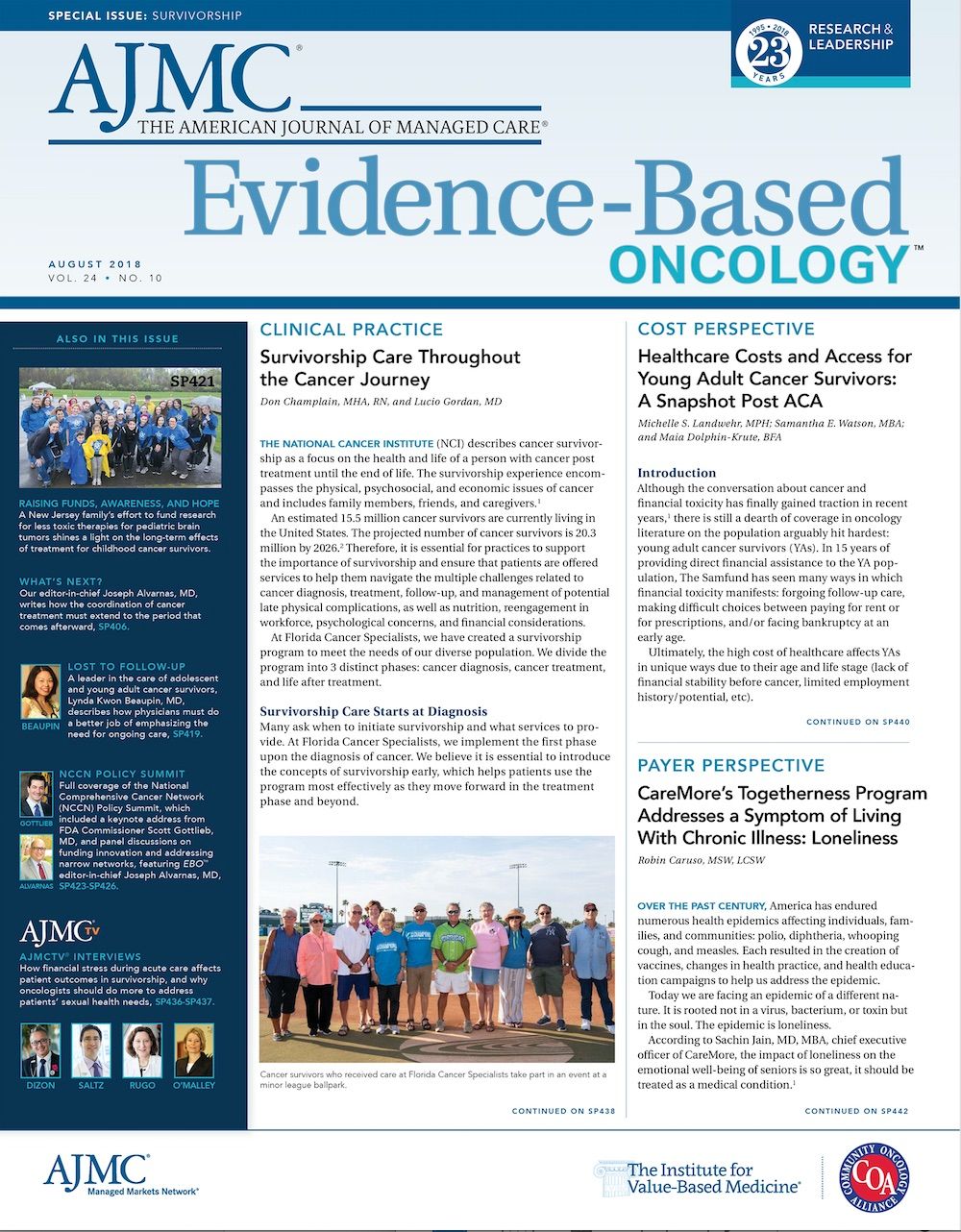- Center on Health Equity & Access
- Clinical
- Health Care Cost
- Health Care Delivery
- Insurance
- Policy
- Technology
- Value-Based Care
From the Editor-in-Chief: What Happens Next?
A letter from our Editor-in-Chief, Joseph Alvarnas, MD.
In the 1972 movie The Candidate, Robert Redford stars as a political upstart who takes on an established politician in an impossible political race. Throughout the campaign, he is guided through every twist and turn by an acerbic, experienced political adviser played by Peter Boyle. At the end of the movie, after winning, Redford’s character looks at Boyle’s as the triumph sinks in and calls out to him with evident terror, “What do I do now?”
As patients navigate their cancer journey, many of their early steps are intensely guided by expert clinicians. Key treatment components, including surgery, chemotherapy, immuno-therapy, and radiation, are supervised and curated by a cadre of healthcare professionals, who are dedicated to ensuring that the right care is delivered—safely—and that patients and their families are supported through the logistics along the way.
When this part of the cancer journey ends, however, the integrated nature of the care experience frequently does also, and care becomes increasingly fragmented and disjointed, often delivered by healthcare professionals who are neither experts in cancer care nor fully prepared to effectively navigate and curate care for patients who have survived cancer. Survivorship care and wellness care following cancer, therefore, often becomes an unintentional afterthought as patients make their way through a highly fragmented healthcare system that is often indifferent to their unique needs. A 2005 Institute of Medicine (IOM) report entitled From Cancer Patient to Cancer Survivor: Lost in Transition highlights the importance of careful survivorship care following cancer treatment.1 However, a recent study of adolescent and young adults with cancer (aged 18-39 years) led by Lynda Kwon Beaupin, who is interviewed in this issue on SP419, found that 37% of the patients did not receive survivorship care post treatment.2 The impact of this lack of an effective survivorship care system is further reflected in this observation by the IOM: “Most cancer survivors will return to work following their treatment but approximately 1 in 5 will have cancer-related work limitations up to 5 years later.”3 Lack of organized posttreatment care may not only compromise a patient’s quality of life but also have a deleterious impact upon their ability to work and achieve a full restoration of function.
In considering the importance of survivorship and postcancer wellness care, we need to realize the entire scope of these services. Effective survivorship care must include relapse monitoring, screening for the emergence of new or secondary cancers, and management of end-organ injury (cardiomyopathy, neuropathy, posttreatment cognitive changes, reproductive organ effects, pulmonary dysfunction, and endocrine and bone health), as well as management of the emotional, spiritual, and psychological effects of having traversed such an intense part of the human experience. The National Comprehensive Cancer Network practice guidelines for survivorship care describe an enormous breadth of care needs that are all too often ignored in patients (and families) who have survived cancer.4
In this issue of Evidence-Based Oncology™, we look at those who are working to make this type of care a reality for young survivors of cancer. A study by The Samfund tracks the impact of the Affordable Care Act on coverage and affordability of cancer care for young adults. Authors from Florida Cancer Specialists outline how survivorship care is integrated into clinical practice from a patient’s first encounter and describe an initiative from CareMore Health, which seeks to address loneliness among seniors and help those recovering from cancer.
The end of cancer care marks the beginning of a life, albeit a different life — one in which some of our illusions about the nature of life are deeply challenged; among the young, this may include a dashed sense of invulnerability or immortality. The incontrovertible reality of cancer treatment is a path for these patients to a life that will, hopefully, go on well past that portion of their lives. Effective survivorship plans can empower patients and families in their ability to successfully and definitively answer the question “What do I do now?”
References
- Hewitt M, Greenfield S, Stovall E, eds. From Cancer Patient to Cancer Survivor: Lost in Transition. Washington, DC: The National Academies Press; 2006. nap.edu/catalog/11468/from-cancer-patient-to-cancer-survivor-lost-in-transition. Published 2006. Accessed August 6, 2018.
- Beaupin LM, Boldt A, Amato K. Come back: identifying targets to engage young adult survivors who have been lost to follow-up. Poster presented at: American Society of Clinical Oncology 2018 Cancer Survivorship Symposium; February 16-17, 2018; Orlando, FL. Abstract 29. meetinglibrary.asco.org/record/157765/abstract.
- Institute of Medicine. Cancer survivorship facts and figures. The National Academies of Science, Engineering, and Medicine website. nationalacademies.org/hmd/~/media/Files/Report%20Files/2005/From-Cancer-Patient-to-Cancer-Survivor-Lost-in-Transition/factsheetfactsandfigures.pdf. Published November 2005. Accessed August 6, 2018.
- National Comprehensive Cancer Network. NCCN Clinical Practice Guidelines in Oncology (NCCN Guidelines): Survivorship. Version I.2018 — July 30,2018. nccn.org/professionals/physician_gls/pdf/survivorship.pdf. Published July 30, 2018. Accessed August 6, 2018.

Quality of Life: The Pending Outcome in Idiopathic Pulmonary Fibrosis
February 6th 2026Because evidence gaps in idiopathic pulmonary fibrosis research hinder demonstration of antifibrotic therapies’ impact on patient quality of life (QOL), integrating validated health-related QOL measures into trials is urgently needed.
Read More
Exploring Racial, Ethnic Disparities in Cancer Care Prior Authorization Decisions
October 24th 2024On this episode of Managed Care Cast, we're talking with the author of a study published in the October 2024 issue of The American Journal of Managed Care® that explored prior authorization decisions in cancer care by race and ethnicity for commercially insured patients.
Listen
Building Trust: Public Priorities for Health Care AI Labeling
January 27th 2026A Michigan-based deliberative study found strong public support for patient-informed artificial intelligence (AI) labeling in health care, emphasizing transparency, privacy, equity, and safety to build trust.
Read More

